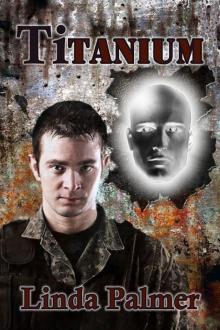- Home
- Linda Palmer
Kiss of Death Page 26
Kiss of Death Read online
Page 26
“Get in, lean forward, and put your hands flat on the dashboard,” he said. “I don’t want to shoot you, but I will if you scream, or try to run.”
I did as I was commanded.
As he climbed in behind the wheel, I said, “I’m cooperating, Arnold. I want to talk to you.” He settled his bulk and closed his door, but kept the weapon pointed at me.
I said, “This position is getting uncomfortable.”
“All right,” he said. “Lean back against the seat and lock your fingers together. Rest your clasped hands in your lap.”
I followed instructions.
He turned the key in the ignition. The motor came to life. He let it idle. “It’s hot outside. I need air-conditioning so I can think,” he said.
His needing to think was good for me. Clearly, his internal “jury” was still deliberating my fate.
Jury. That thought inspired a tactic I could take with him. “Arnold, you went a little crazy because you thought your daughter had been molested. Veronica’s death was just an accident. No jury would convict you.”
He kept the gun on me. “What about my shooting Garwood? That wasn’t in the heat of the moment. I’d charted his habits, found out about his five A.M. jogging routine, and I lay in wait for him.”
“But you didn’t kill him,” I said. “You could have—you could have aimed at his head or his chest—but instead you fired to hurt him, to make him suffer. Isn’t that right?”
“Wrong. I fully intended to kill him, but I wanted him to die in as much pain as possible, because of what he … Oh, God!” Arnold’s face contorted in horror. It was as though finally the full realization struck him that what he had done was based on a child’s lie. He whispered, “Didi … she’ll never get over knowing …”
Didi was his weakness. I hammered on that. “You can protect Didi. Let’s go to the District Attorney. You’ll explain what happened, and make a deal. You can say you thought Jay had been inappropriate with Didi—you don’t need to say she told you that he had. If you confess, and plea-bargain, there won’t be a criminal trial. She won’t have to testify about what she did. You’ll spare her a terrible ordeal. And you can probably make a deal with Jay for no civil trial. He’d only sue you for money, compensation for what he’s going through. If you’re willing to pay, I’ll make him understand that he’s better off agreeing to a settlement instead of waiting years to get to court, and paying a lawyer.”
We sat in silence. Arnold had set the air conditioner on high. While he was thinking, the temperature in the vehicle got lower and lower. I began to shiver, but I wasn’t sure whether it was from the cold or from the fear that I wouldn’t leave this car alive.
Well, I wasn’t going to just sit here and wait to die. Carefully, I unlocked my fingers and slid my right hand over toward the passenger door. Keeping my body straight, moving only that one hand, I explored the door until I grasped the handle.
At that moment Arnold heaved a deep sigh. I stiffened. He’d made up his mind and was going to do—something. With a little groan, he transferred the pistol to his left hand, turned the key again, and started the car.
My hand gripped the door handle. If I had to, I’d jump, risking minor injuries to stay alive. “Arnold, where are we going?”
“To the police station,” he said.
Traffic was light. The Twentieth Precinct was only three blocks away. We were in front of the entrance in a couple of minutes.
Arnold stopped the car, but didn’t turn off the engine. “Get out.”
“You can pull into that spot next to the cruiser,” I said.
“Open your door and get out.” His voice was without inflection. The voice of a robot. At this moment, he seemed even more frightening than he had been back in the alley. I wasn’t going to argue with him.
I opened the door, swung my right leg out onto the street. Suddenly, I felt a powerful shove in the middle of my back. I went tumbling out of the car, onto the cement. My left shoulder thudded against the curb.
The uniformed officer at the entrance yelled, “Hey! Stop!” as Arnold floored the accelerator and zoomed away. The Lincoln’s taillights, glowing like two red eyes, disappeared as the car screeched around the next corner.
“Are you okay, miss?” asked the police officer as he helped me to stand.
My shoulder hurt where it collided with the curb, my left knee was skinned and the fabric covering it shredded, but when I reached into my right-hand pocket and pulled out the unharmed little tape recorder, I said, “I’m fine, but I need to see Detective Phoenix right away.”
Chapter 50
THE VOICE QUALITY on the tape recording was excellent. Copies were made and sent over to the office of the District Attorney. A warrant for Arnold’s apprehension was drawn up, signed, and an all points bulletin alert broadcast to law enforcement personnel in the tristate area, warning that Arnold Rose should be considered “armed and dangerous.”
As soon as Matt and G. G. listened to the tape and began the warrant process, I phoned Nancy, to tell her what had happened, and that she was no longer in danger of going to prison. She would have her life back, and be able to resume her career.
Although profoundly relieved that her ordeal was over, Nancy couldn’t take pleasure in Arnold’s situation; there was a time not long ago when she’d thought she was in love with him.
One thing about this resolution worried me. I asked Nancy, “What’s going to happen to Didi, without either of her parents? She can’t stay on with Mrs. Woodburn.”
“Arnold has a sister in Maryland,” Nancy said. “Carol Grant. I’ve met her a few times. She’s a lovely woman, with a nice husband who’s a public affairs officer in the Navy. They have a ten-year-old daughter. Didi could probably live with them. I think I should phone Carol now, and tell her what’s happened. I’d hate to have her hear about this on the news.”
Ten minutes later, my cell rang. “I just talked to Arnold’s sister,” Nancy said. “She’ll be at Mrs. Woodburn’s door by the time Didi wakes up tomorrow.”
IT WAS NEARLY four in the morning, and G. G. had finally gone home to bed. Only four men and women on the midnight to eight A.M. shift were at their desks, doing paperwork. I’d never been in the squad room when it was this quiet.
Matt and I were having sandwiches and coffee at his desk when Matt’s phone rang. He picked it up, listened, said “good” a couple of times, then thanked whoever called and hung up. He looked up at me, grinning. “They got Rose at JFK. He’s claiming he doesn’t know who he is, or how he got there. He didn’t have a weapon on him.”
“What’s this ‘I don’t know who I am’ business? Is he going to try an insanity defense?”
Matt shrugged. “That’s up to him, or his lawyer. We’re done here. I’ll take you home.”
I crumpled up the last of my sandwich and the wrapper and tossed it into Matt’s trashcan. “Will you stay over with me?”
“Only if you promise not to get frisky until I’ve had a few hours sleep,” he said.
“I promise.”
As we exited the precinct house, out into the predawn air, I asked playfully, “Does a promise count if I kept my fingers crossed?”
As it turned out, we were both too tired to get frisky. I slept in the circle of Matt’s arms, and Magic slept on top of Matt.
Hours later, when we awakened, I knew the time had come to tell Matt what I’d been keeping from him. At any moment, the media would have my story. I didn’t want Matt to learn about me that way.
I turned around in his arms, to face him. He brushed the hair out of my eyes.
“I must look a mess,” I said.
He smiled sleepily. “My kind of mess.”
“Matt, there’s something you don’t know about me …”
“There’s a lot I don’t know. I figured out months ago that there was something important you were keeping to yourself. It made me a little crazy that you wouldn’t let me really get to know you, but I haven’t pushed. I wanted y
ou tell me about it when you were ready.”
“I am now …”
I told Matt everything—about Ray Wilson, about Walter rescuing me from him, and giving me his last name. I told him what I hadn’t known until Bobby found Walter retired in Florida: that Walter had arranged for my safety and my schooling. I even told Matt how and why I went to Belle Valley, what I did to make Ray Wilson tell me where I came from. I described the interview Walter and I did with the Ohio police, and that I’d told them they could go public with my story, in the hope it would encourage other people who had been hurt by Wilson to come forward and testify against him.
From time to time during my story, I felt Matt’s muscles clench, but he listened without interrupting. He just held me, and gently stroked my back. When I finally stopped talking, he tightened his arms around me and whispered, “I’m so sorry you had to go through that.”
“I survived, and so many people have gone through a lot worse. There’s one more thing I have to tell you, and if it makes a difference, I’ll understand.” I felt Matt tense. “Because of … an injury … when I was little, I can’t have children.”
Matt was quiet for a few seconds, and then he eased himself into a sitting position. “Are you sure about that? Doctors make mistakes.”
I sat up, too, and shook my head. “There’s no mistake. Most people want children. You should know before we … before we get too serious.”
Matt said softly, “I’ve been serious about you for a long time.”
“But you didn’t know about this. It must matter to you.”
“I guess I thought I’d have kids someday, but it hasn’t been something I’ve ever focused on. I’ve seen enough awful things in my job to know there aren’t any guarantees in life.”
“What are you saying?”
“That you’re more important to me than any woman I’ve ever known,” he said. “I’m a lucky guy.”
We lay down again, and fell asleep in each other’s arms.
BECAUSE OF MY connection to a hit television show, my story did get into the media. All over the media.
My friends and coworkers were kind, supportive, and nonintrusive. I saw sympathy in their eyes, but they didn’t ask any questions.
At the office, Betty fielded calls from reporters who wanted interviews. I didn’t give any. TV magazine shows called, wanting me to guest on camera. I refused. I didn’t want attention; I wanted Ray Wilson to be locked up for the rest of his life.
Walter had been in Ohio for five days when he called with the news I’d been waiting for: after reading about me, a mother had come forward with her young daughter to testify that Ray Wilson had molested the girl in a park restroom. At last, there was evidence recent enough to bring him to trial.
Wilson never got to trial. While he was in the jailhouse shower, someone stabbed him to death with the sharpened handle of a metal spoon. The police went through the motions of an investigation, but Walter said they didn’t try very hard to find Wilson’s killer.
Jay Garwood recovered from being shot by Arnold Rose, and became a celebrity because of it. I reworked his storyline slightly, so that he could come back to the show without slowing his healing. He immediately asked Tommy for a raise, based on his belief that the publicity about him was bringing many new viewers to the show. It was true that our ratings were up. Tommy agreed to a modest increase, and said he would consider more when Jay’s current contract expired.
Nancy decided to use vacation time she’d accrued and take a month off before she went back to work at the law firm. “Chet’s invited me to go to Vienna and Prague with him. Maybe even Bratislava. He needs to study some recently declassified World War Two archives for his book. We’ll be traveling just as friends. Separate rooms. I insisted on paying for my own plane tickets and hotel bills. What do you think?”
“I think you should at least let him pay for dinner when you two go out,” I joked. “Seriously, that trip is a wonderful idea.” The enthusiasm in my voice was genuine. “After all you’ve been through, you need a radical change of scene. I predict you two will have a great time together. Besides, as you mentioned once, he’s tall enough so you can wear high heels with him.”
“Thank you,” she said. “What do you want me to bring you back from Europe?”
“Anything—as long as it’s made of chocolate.”
That night, while Matt and I were having dinner, he said, “I’ve been thinking about your mother.”
“So have I.”
“She left you twenty-seven years ago. It’s likely she’s no longer alive.”
“More than likely—it’s probable.”
Matt reached across the table and took my hand. “Are you going to look for her?”
“I don’t know …” I said. And that was the truth.

 Balmythra
Balmythra Shadow Wolf (Wolf of My Heart Book 7)
Shadow Wolf (Wolf of My Heart Book 7) Kiss of Death
Kiss of Death FAE-ted
FAE-ted Sidekicks
Sidekicks Ivy's Eyes
Ivy's Eyes In Wildest Dreams
In Wildest Dreams His Wolf (Wolf of My Heart)
His Wolf (Wolf of My Heart) Wolf-Way (Wolf of my Heart)
Wolf-Way (Wolf of my Heart) Titanium
Titanium Wolf-Run
Wolf-Run Somewhere in the Middle
Somewhere in the Middle